Sabrent Rocket Q 2TB Performance Testing
We are moving towards using larger test sizes on our benchmarks, but on several tests, we also used the smaller default test size. This allows us to see the difference between lighter and heavier workloads.
BlackMagic Disk Speed Test
This is a popular speed test in the video community. It shows whether a storage device is suitable for throughput required at a given video format.
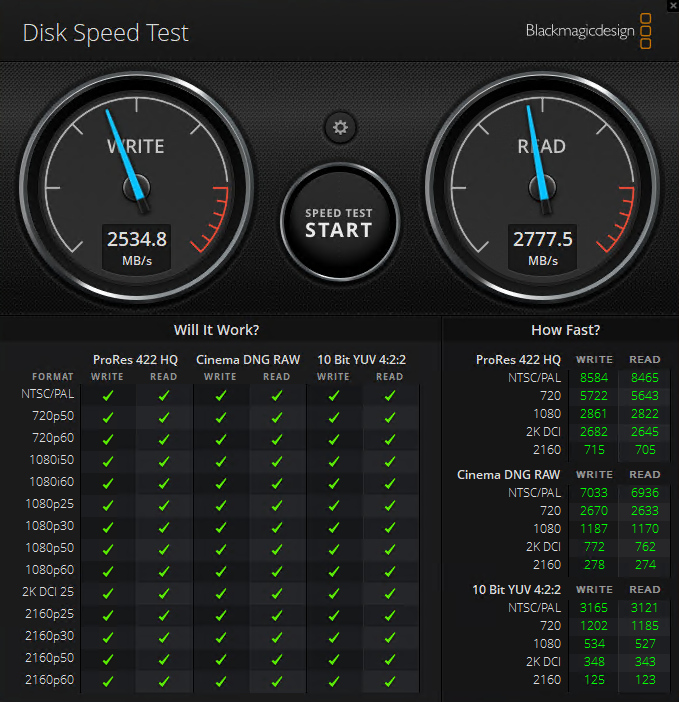
As a PCIe 3.0 NVMe SSD, the Rocket Q 2TB has a good showing here and handles every format this benchmark can test for.
CrystalDiskMark 7.0.0 x64
CrystalDiskMark is used as a basic starting point for benchmarks as it is something commonly run by end-users as a sanity check.
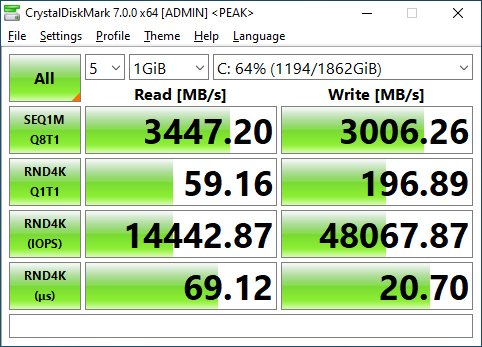
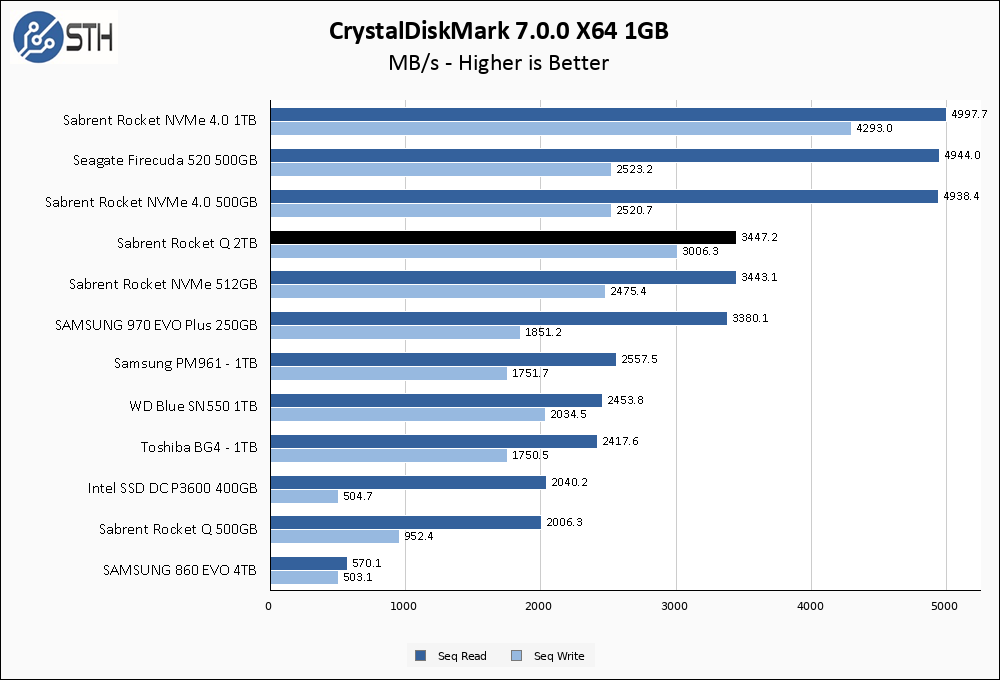
Using the 1GB test set, the Rocket Q 2TB hits all its advertised speeds, and actually manages to top the charts among the PCIe 3.0 SSDs we have tested.
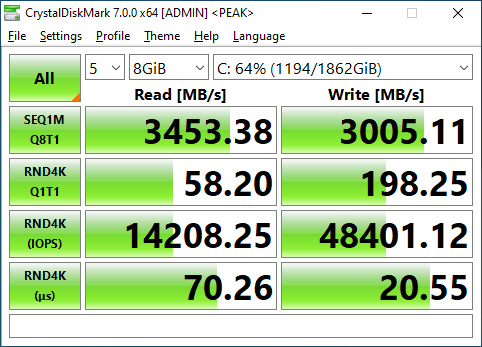
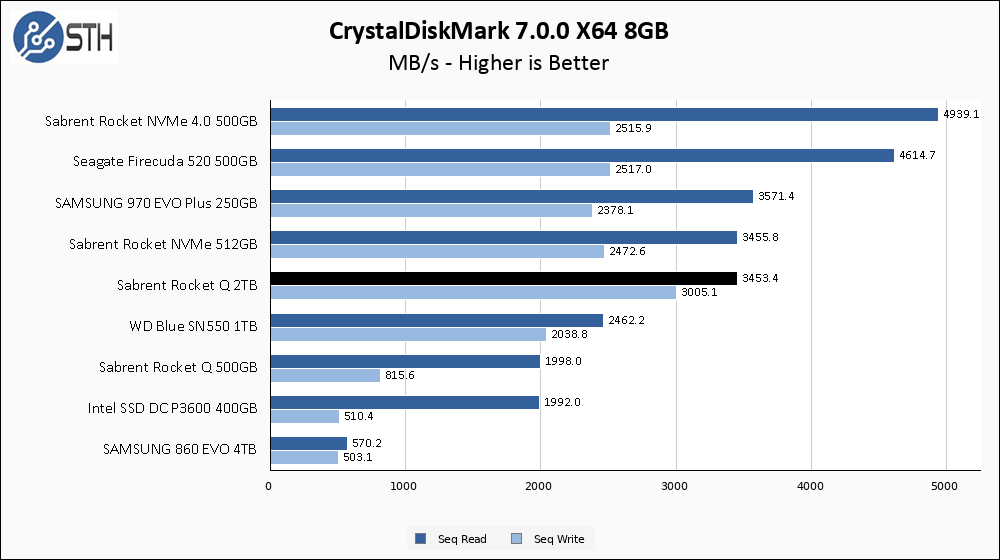
Moving to an 8TB test set, the Rocket Q 2TB is unaffected by the change.
ATTO Disk Benchmark
The ATTO Disk Benchmark has been a staple of drive sequential performance testing for years. ATTO was tested at both 256MB and 8GB file sizes.
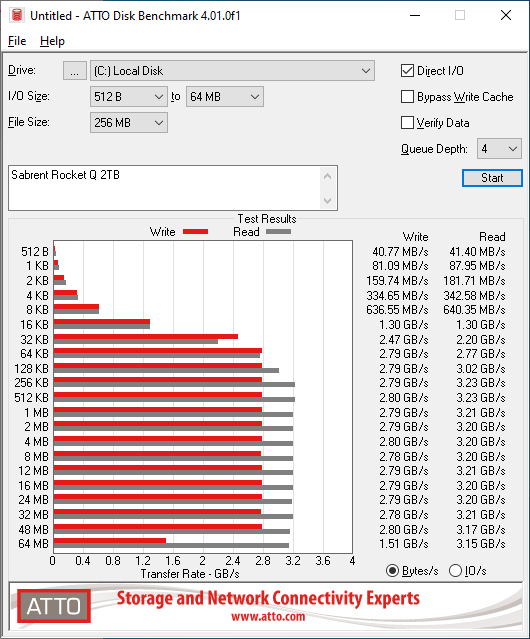
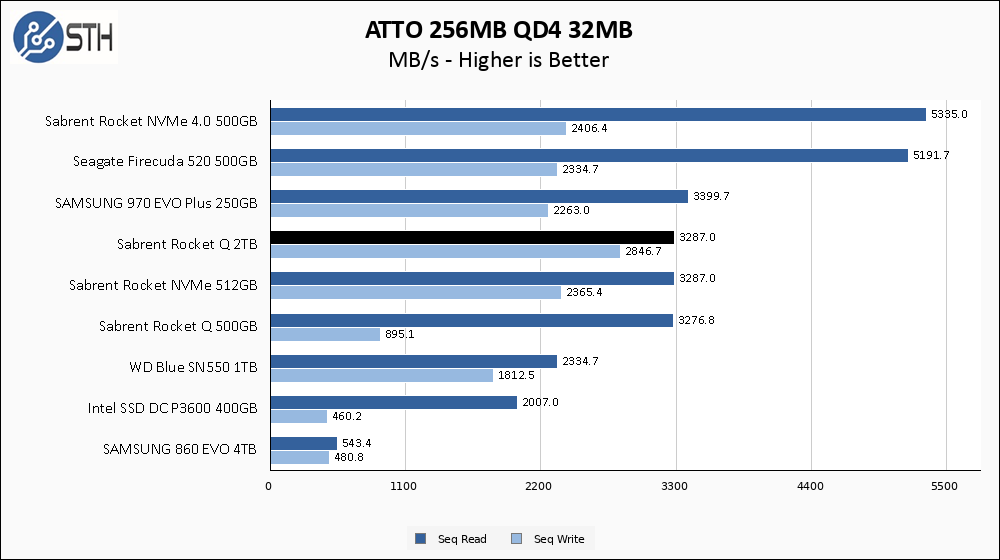
Compared to CrystalDiskMark, ATTO’s read and write performance is a tick slower but not by much. Overall there is strong performance here compared to the rest of the PCIe 3.0 crowd.
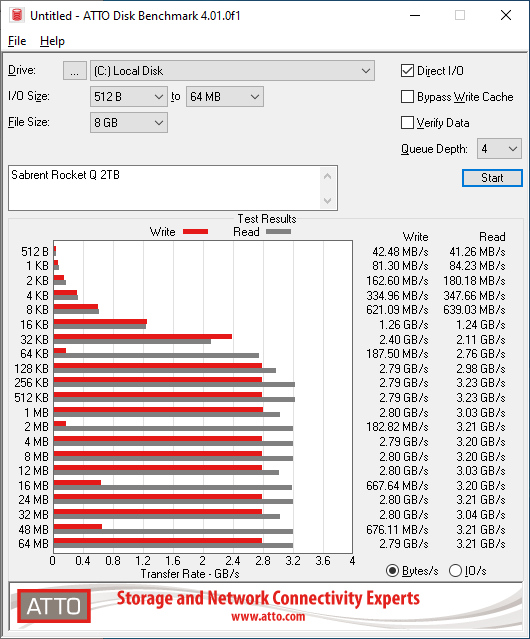
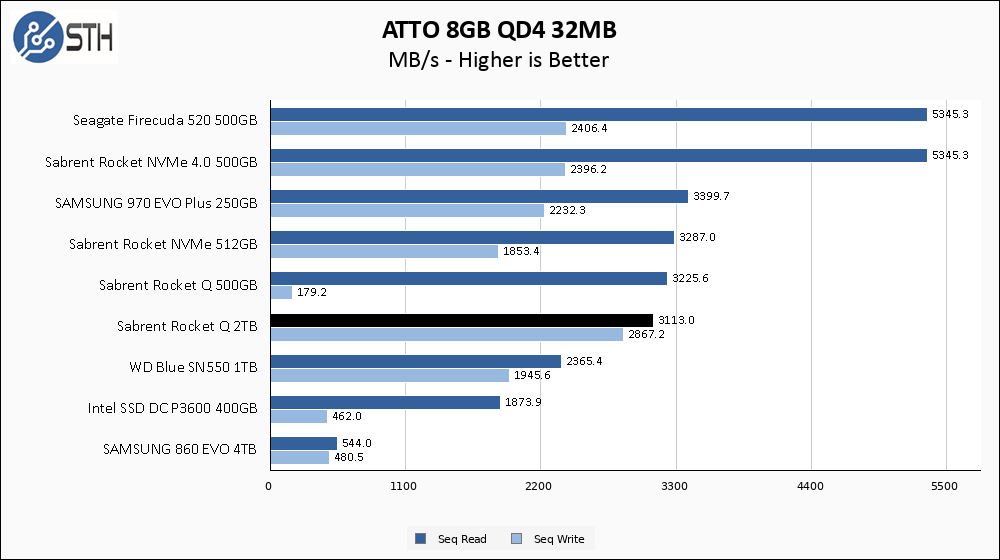
We generate our graph data from the 32MB chunk size datapoint of ATTO, but looking at the whole graph you can see some wild swings in write speed. Overall though, performance was much improved compared to the Rocket Q 500GB thanks to the larger SLC write cache area.
Anvil’s Storage Utilities
Anvil’s Storage Utilities is a comprehensive benchmark that gives us a very in-depth look at the performance of drives tested. This benchmark was run with both a 1GB and 8GB test size.
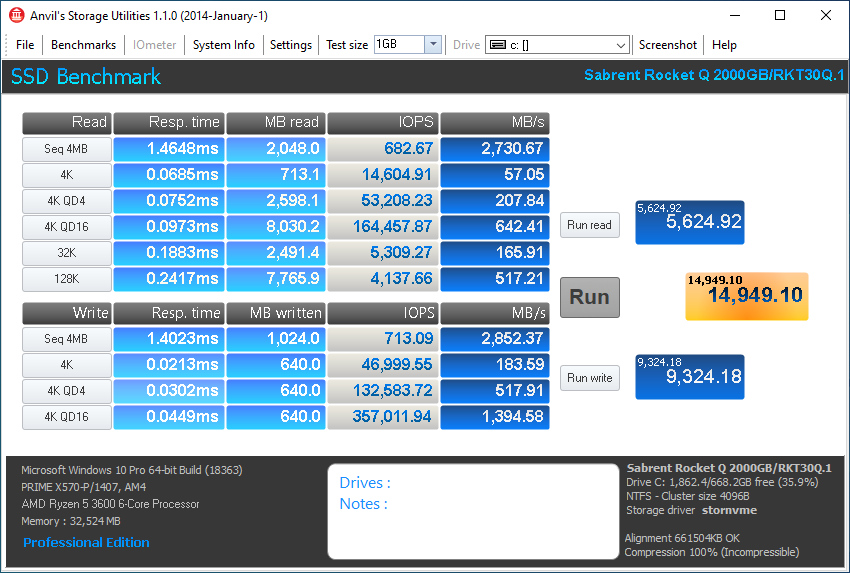
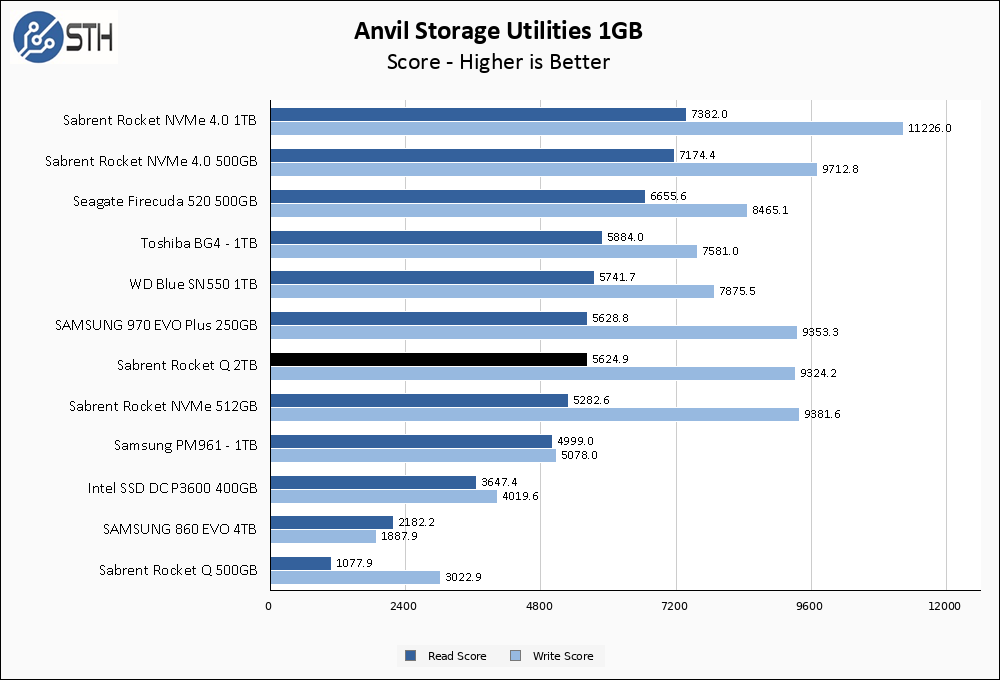
As with many drives we have recently tested, Anvil tends to show lower read performance than either ATTO or CrystalDiskMark, while write speeds trend closer to those other testing utilities. Overall the Rocket Q 2TB has a good showing here and easily smashes its little brother.
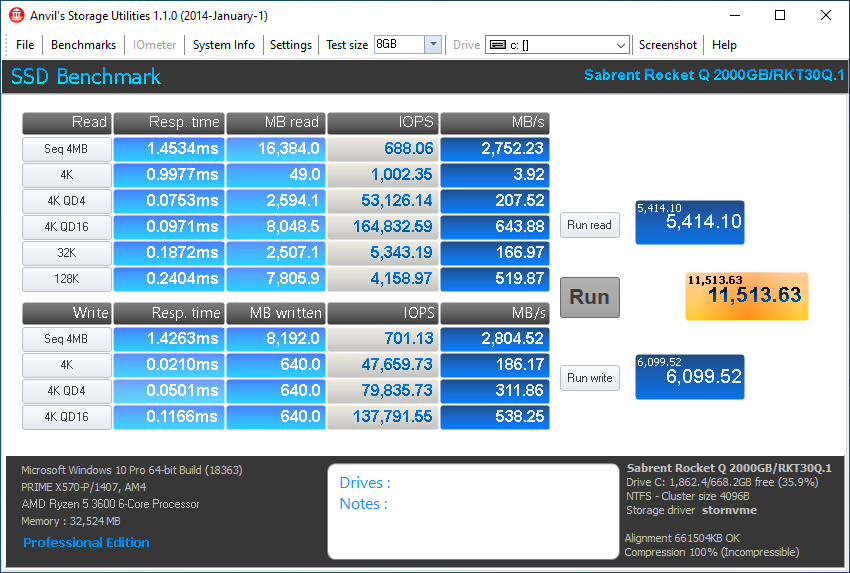
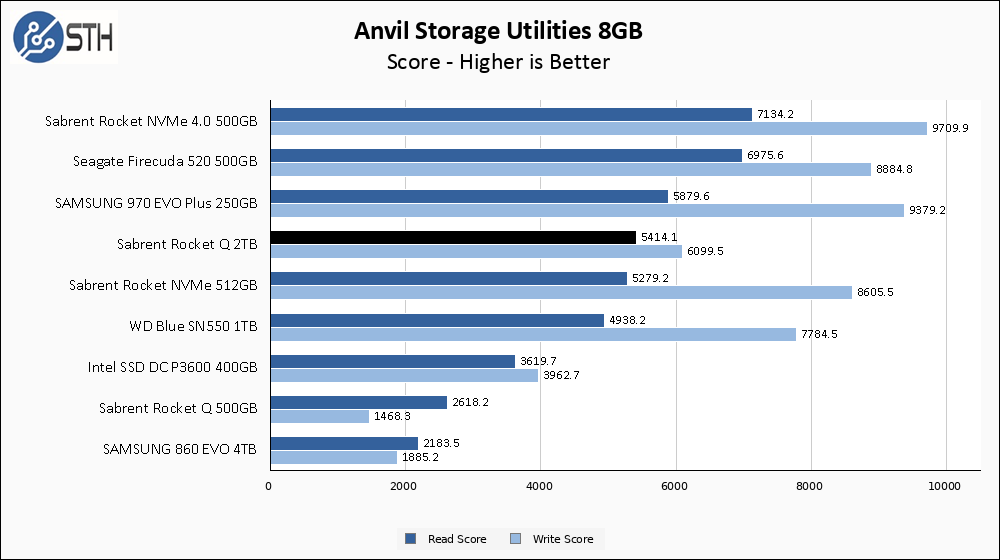
With 8GB test size, writes speeds dipped a bit under the heavier queue depth loads. TLC-based SSDs like the Samsung and Rocket NVMe drives fare better here.
AS SSD Benchmark
AS SSD Benchmark is another good benchmark for testing SSDs. We run all three tests for our series. Like other utilities, it was run with both the default 1GB as well as a larger 10GB test set.
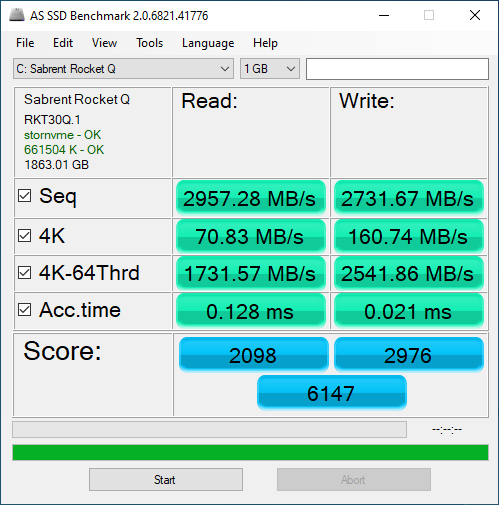
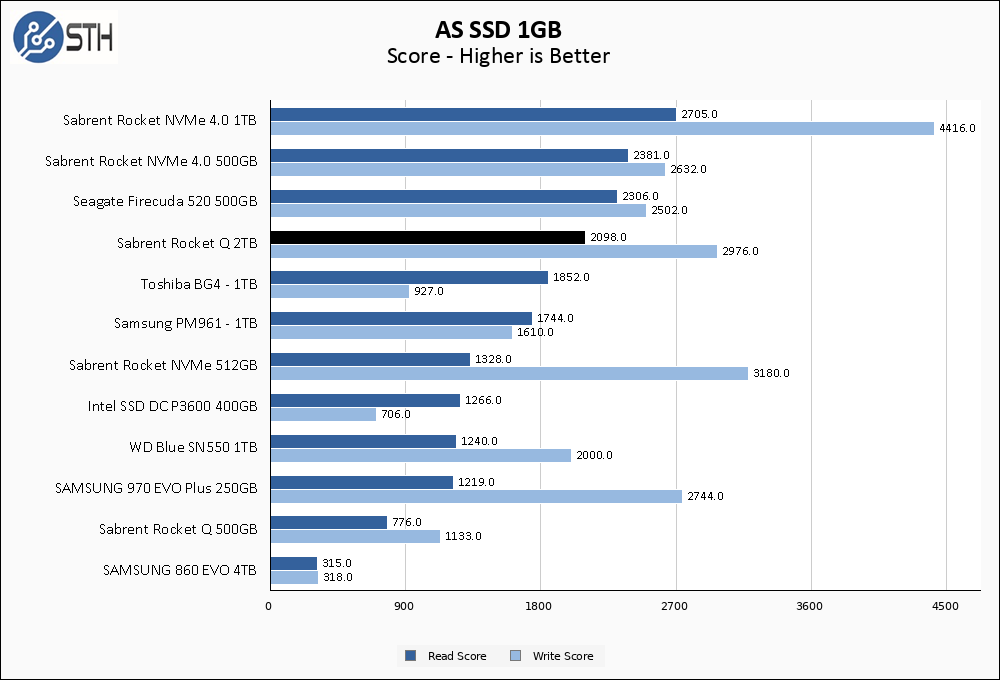
The Rocket Q 2TB manages to top the PCIe 3.0 charts again, with a good margin of victory on the read speed and only being narrowly edged out in write speed by the Rocket NVMe 512GB unit. This is due in large part to the more populated controller on the Rocket Q 2TB, and if the Rocket NVMe was a larger capacity drive it would likely beat out the QLC based drive.
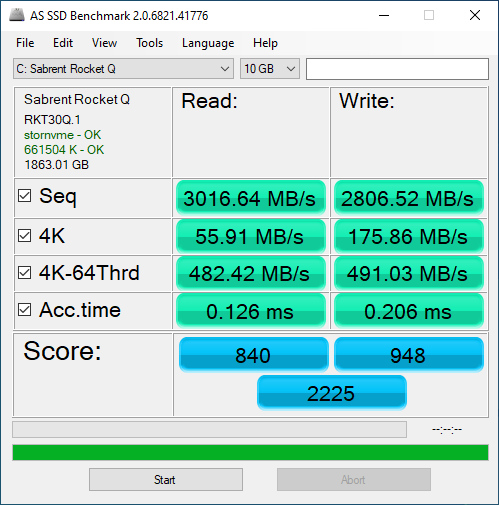
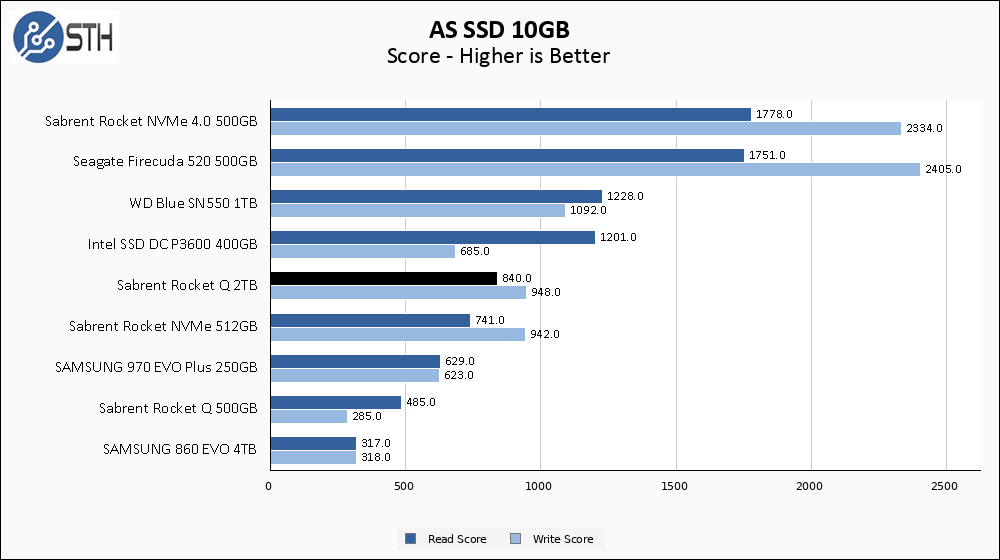
The larger AS SSD test set tends to dramatically affect performance of the consumer class SSDs we test, and the Rocket Q 2TB is no different in that regard. It holds up reasonably well, and much better than the 500GB version of the drive, but still takes a big dip compared to the smaller version of this benchmark.
PCMark, SPECworkstation, and our conclusion are up next.

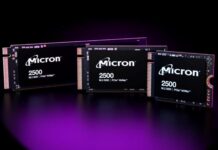
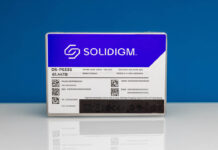
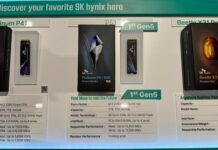
what i don’t understand, that these days they release pci-e gen 3 nvme device. not specifically Rocket, but any other manufacturer. pci-e gen 4 is almost 1 year ago released/available, but manufacturer still release pci-e gen3 devices….i don’t get that.
btw, nice review
While running CrystalDisk, ATTO, Anvil and PCmark gives useful numbers for comparison, as seen with drive managed SRM drives, diesel engines, vacuum cleaners and televisions among other things, it’s possible for manufacturers to game the standard tests.
It would be nice if Serve the Home put together a set of realistic usage benchmarks and which confirm that TRIM support and other features really work while checking performance over time as well as reliability and heat generation.
@Eric,
Since this is primarily a consumer drive rather than a piece of server equipment, most ‘realistic’ loads would actually be less stressful than the tasks given by our benchmark suite. With that said, the benchmarks published in my review articles does not represent the totality of my time spent with the drives I review, and any odd behavior observed would of course be investigated and reported upon.
As for TRIM support, TRIM is fully functional. However, its use is actually avoided during the benchmarking – after I load the drive to 85%+ capacity and then purge some data, I intentionally do not issue a TRIM command and run the full benchmark suite with the drive in a ‘dirty’ state. Allowing a TRIM to take place would likely increase some of the performance numbers, but “performance right after a TRIM” is not the normal scenario for a SSD drive. My goal is to benchmark a drive that has been simulated to what I would consider its ‘middle aged’ state, hence overfilling it, deleting some data, and running it at 60%+ space used for the testing.
Many of us still use machines that only support up to Gen 3. If I’m spending 3K on a laptop, I like that Sabrent caters to the three year old machine. I just bought a 1T Sabrent Rocket NVMe as my backup OS drive. And I will be getting this 2T model to back up my 2T NVMe data drive.
I recently upgraded my 7 year old machine, and have some PCIe 4 slots, but I still opted for a 1tb nvme drive for many reasons, cost not being the top one.
For one thing, going from sata to nvme ssd yielded nearly 5x increase in read throughput. More than adequate for me, and makes memory swapping become an unnoticed thing.
When I next buy a drive — typically every 12 months (to take advantage of falling prices to replace the oldest drive in my cluster), I might consider a v4 one, especially if next generation consoles make them more price competitive.
I meant a 1tb pcie 3 drive
erik
PCIe4 is only available on niche products – and until Tiger Lake / Rocket Lake S / Ice Lake SP Xeon drop later this summer, it will not be mainstream. AMD’s market penetration is so small that major manufacturers (Samsung most notably) are holding off until there is sufficient number of machines that can take advantage of the faster interface – it is the same reason that there are only a few NICs that require PCIe4. Ampere GeForce is also being timed to make sure there is a sufficient market size to make that product viable.
It would be good to see a comparison table of pricing for 2TB++ drives.
@250, this is significantly more expensive per TB than Micron or Samsung’s SATA QLC offerings (which sit around $380 for 4TB in the UK despite one being consumer and one Enterprise), but this parks more tanks on the lawn of the HDD makers.
SanDisk was selling a 2TB SATA SSD last week ( dont know if it is still going on ) for $150.
And I was thinking of for this sort of price does it start to make sense to replace NAS drive to SSD.
Sandisk == WD. Do you really want to give HDD makers your money after the SMR stuff?